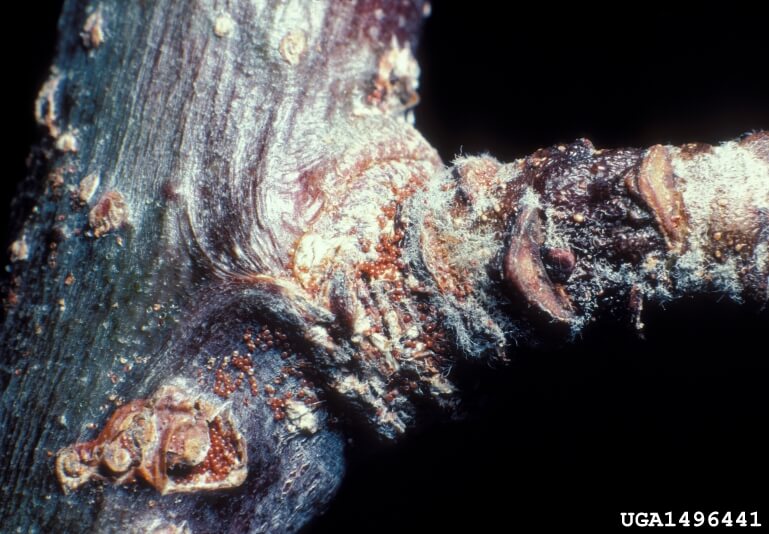
Dormant oils can help manage red mites and other soft-bodied insects. Photo: University of Georgia Plant Pathology, Bugwood.org.
As the weather cools, your trees are slowing down for their winter’s rest. But some unwanted insects and mites are still active. Many scales, mites, codling moths, aphids and other soft-bodied pests lay eggs now. The eggs or mature females survive the winter on the bark of trees and shrubs. Some fungal diseases also overwinter on trees, leaves and in soil.
In Harmony applies dormant oils as needed in winter to help manage pests and diseases. We will begin applying dormant oils in early December.
If you are a current tree and shrub care client, this service is part of your program. If you are not on the service program, and you suspect insect problems on one of your trees, we would be happy to give you an estimate for applying dormant oils. Contact us.
What are dormant oils?
“Dormant” refers to the time of year when the oils are used, not the oils themselves. During winter dormancy neither the plants nor insects are actively growing.
Dormant oils are usually refined petroleum oil, cottonseed oil, canola oil or a similar product. We use an OMRI certified mineral oil for our dormant sprays. OMRI certification means organic farmers and producers can use it. The oil we use is both an insecticide and mild fungicide. We use it on fruit trees, birch trees and some evergreens.
The oils work by smothering the pest. They may block the pests’ breathing pores, penetrate and destroy their cells or desiccate them (dry them out). The oils need to contact the insect or mite directly to work. It may look like we are spraying a tree or shrub heavily because we need to reach all of the plant’s nooks and crannies.
Dormant oils have a low toxicity to humans, birds, beneficial insects and animals. They don’t leave a harmful residue. They lose their ability to control pests once dried, however.
What pests do dormant oils manage?
The oils will not work on all overwintering insects. It depends on where they spend the winter. For example, the spruce spider mite overwinters as an egg on evergreens such as arborvitae and juniper. So, dormant oil sprays will be effective against this pest.
On the other hand, the twospotted spider mite overwinters in plant debris or mulch, not on a tree branch or trunk. It would be difficult to find and treat this pest.
Dormant oils are very effective at killing most overwintering scales. However, scales that overwinter as eggs are tougher to control. This is because eggs are usually stacked on top of the each other, and the dormant oil may not contact the bottom layer.
Dormant oils are unlikely to harm beneficial insects because they are applied at a time when beneficial insects are not around. This means that natural enemies of mites and scales will survive to help control these pests.
Oil sprays can harm some plants. In Harmony takes care not to treat plants that may be harmed by oil sprays.
Contact us if you would like to know more about our natural tree and shrub care services.
More information on dormant oils
- Just what is dormant oil?, University of Illinois Extension.
- Why Use Dormant Oils?, University of Illinois Extension.
- Homemade Dormant Oil Spray for Fruit Trees, SFGATE.
- Insect Control: Horticultural Oils, Colorado State University Extension.
- Pesticide Information: Horticultural Oil, University of California IPM Program.
